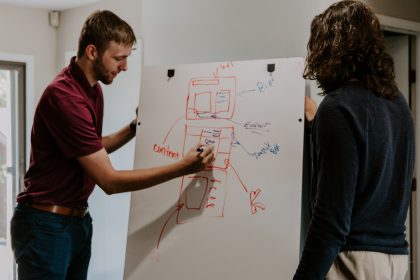Often meetings with colleagues have an added element: we want them to complete something without having the authority to enforce their follow-through. Coach training provides skills that are applicable. This blog follows the format of the previous examples.
To simplify the example, C is the person who completed the coach training. P is the person with whom they are talking.
The scenario: colleagues are meeting. One colleague, C, wants another colleague, P, who is behind schedule, to follow-through with their area of work.
C: How are you?
P: Fine.
C: Good to hear. What is your status?
P: I told you, we are stuck because we cannot get the parts.
C: Makes sense. What are the options?
P: Wait until the parts come in.
C: Makes sense. What else is possible?
P: Putting pressure on the vendor.
C: OK. What else?
P: Check with another department to see if they have extras we can have and when ours come in they will be replaced.
C: OK. What else?
P: Ask the boss for an extension.
C: OK. What else?
P: That‘s it.
C: OK. Which approach do you want to use first?
P: Check with the other department.
C: Then which idea is second?
P: Call the vendor and explain the problem.
C: OK. And then?
P: Talk to the boss.
C: Makes sense. How can I best support you?
P: Well, actually, if you go with me to the other department that will help.
C: Absolutely. When do you want to go?
P: Let’s walk over there right now.
C: Perfect. Thank you.
P: Glad we are working together on this thank you.
By accepting responses and asking for options, P applied coaching skills and moved the project forward. Graduates of coach training will recognize the questions and the words used. Coaching is a powerful process because it is a positive and proactive way to empower others.



